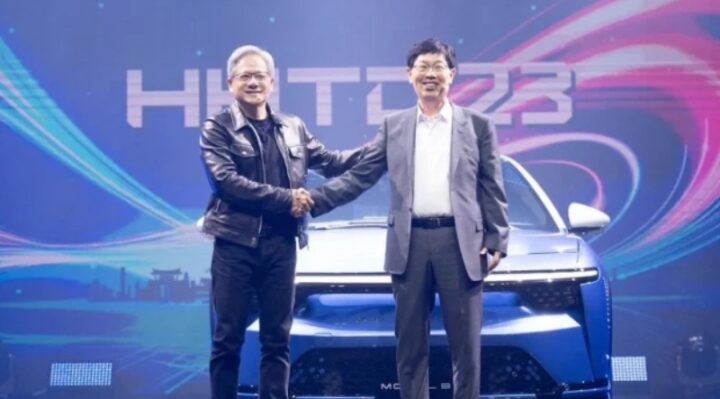
Together, Nvidia and Foxconn are constructing “AI factories,” a new type of data centers that claim to have the supercomputing ability to speed up the creation of industrial robots, self-driving cars, and other autonomous devices.
The partnership was announced at Hon Hai Tech Day in Taiwan on Tuesday by the founder and CEO of Nvidia, Jensen Huang, and the chairman and CEO of Foxconn, Young Liu. The AI factory, which will be constructed to sort, refine, and turn enormous amounts of data into useful AI models and information, is based on an Nvidia GPU computer infrastructure.
“On the one hand, you’re constructing this innovative EV car, and on the other hand, we’re building this full end-to-end system…Speaking at the event, “with an AI brain inside that enables it to interact with drivers and passengers, as well as autonomously drive, supported by an AI factory that produces a software for this automobile. “This automobile will experience life and gather additional data. The data will be sent to the AI factory, which will update all of the AI fleet’s software and make software improvements.
The collaboration between the AI factory and Foxconn expands upon their agreement to create platforms for autonomous vehicles, which was announced in January. In accordance with that deal, Foxconn agreed to serve as the major provider of electronic control units (ECUs) for the automotive industry. These ECUs will be constructed using Nvidia’s Drive Orin system-on-a-chip (SoC), a supercomputing AI platform that supports autonomous driving capabilities. On Tuesday, Foxconn also declared it planned to produce ECUs using Nvidia’s next-generation SoC, Drive Thor, starting in 2025.
As a result of that partnership, Foxconn announced that the vehicles it produces as a contract manufacturer will be built with Nvidia’s Drive Hyperion 9 platform. This platform includes Drive Thor as well as a collection of sensors like cameras, radar, lidar, and ultrasonic that are essential for self-driving capabilities.
Even though Foxconn is being sued by its former partner Lordstown Motors, the company has already agreed to construct electric vehicles for Fisker. In particular, if it wants to compete with Tesla, the automaker will need scale to make its AI factories profitable.
Because Tesla’s Dojo supercomputer, which the Elon Musk-owned company began producing over the summer, is practically competed with by these AI factories. Tesla’s neural networks, which power, refine, and enhance “full self-driving” (FSD), the automaker’s advanced driver assistance system, will be trained by Dojo. The strong computation of Dojo will be used in Musk’s dream for FSD to become fully autonomous one day.
Tesla now utilizes an impressive Nvidia GPU-based supercomputer, but the new Dojo will be constructed just for Tesla using its own hardware. According to the business, the Foxconn-Nvidia AI factories would utilize Nvidia’s GH200 Grace Hopper Superchip and AI Enterprise software.
The factory will be used for purposes other than self-driving cars.
Foxconn’s aim of transforming itself “from a manufacturing service company to a platform solutions company” by scaling the AI factories across diverse industries was disclosed on stage at Hon Hai’s tech event by Liu. Foxconn’s initial focus is on three platforms: smart manufacturing, smart cities, and smart EVs.
Huang said, “This is a factory that takes data input and produces intelligence as an output,” and Liu nodded in agreement. “Every industry and every business will have an AI factory in the future.”



